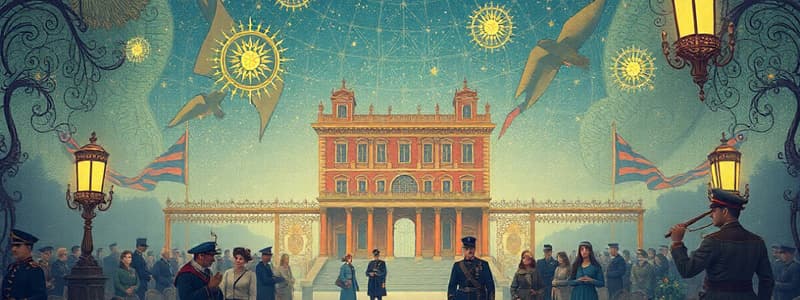Podcast
Questions and Answers
What main factor contributed to the stalemate on the western front during World War I?
What main factor contributed to the stalemate on the western front during World War I?
Which countries comprised the Central Powers during World War I?
Which countries comprised the Central Powers during World War I?
What event prompted the United States to enter World War I in April 1917?
What event prompted the United States to enter World War I in April 1917?
Why was Russia excluded from the Paris peace talks in 1919?
Why was Russia excluded from the Paris peace talks in 1919?
Signup and view all the answers
What was a significant advantage for the United States when entering World War I?
What was a significant advantage for the United States when entering World War I?
Signup and view all the answers
What was the main purpose of the Paris Peace Conference?
What was the main purpose of the Paris Peace Conference?
Signup and view all the answers
Which countries were primarily represented by the Big Four at the Paris Peace Conference?
Which countries were primarily represented by the Big Four at the Paris Peace Conference?
Signup and view all the answers
What did the Treaty of Versailles require Germany to do in terms of military capability?
What did the Treaty of Versailles require Germany to do in terms of military capability?
Signup and view all the answers
Why did the leaders of France and Great Britain focus on punishing Germany after World War I?
Why did the leaders of France and Great Britain focus on punishing Germany after World War I?
Signup and view all the answers
What was the primary motivation behind Woodrow Wilson's Fourteen Points?
What was the primary motivation behind Woodrow Wilson's Fourteen Points?
Signup and view all the answers
Which clause did Japan request to be included in the Treaty of Versailles?
Which clause did Japan request to be included in the Treaty of Versailles?
Signup and view all the answers
How did Italy feel about the outcomes of the Paris Peace Conference?
How did Italy feel about the outcomes of the Paris Peace Conference?
Signup and view all the answers
What was one requirement imposed on Germany regarding its colonies?
What was one requirement imposed on Germany regarding its colonies?
Signup and view all the answers
What was the League of Nations established through?
What was the League of Nations established through?
Signup and view all the answers
Which country was primarily responsible for lending money to the British and French during WWI?
Which country was primarily responsible for lending money to the British and French during WWI?
Signup and view all the answers
Study Notes
End of World War I
- Stalemate by 1917: Weapons like machine guns created static trench warfare along the Western Front in France.
- Allied Powers (Entente): France, Great Britain, Italy, and the Russian Empire.
- Central Powers: Germany, Austro-Hungarian Empire, and the Ottoman Empire.
- Eastern Front Collapse: The Russian front was crumbling, and Allied forces advanced into the Ottoman Empire.
- US Entry (1917): Unrestricted submarine warfare and the Zimmerman Telegram (Germany's offer to Mexico for an alliance in exchange for land) drew the US into the war.
- US Contribution: The US's manufacturing capacity and fresh troops were vital.
- Armistice (1918): Central Powers sought a negotiated peace treaty on November 11, 1918.
- Paris Peace Conference (1919): Allied diplomats met to determine the terms of the Treaty of Versailles. Russia was excluded due to its prior treaty with the Central Powers.
Treaty of Versailles
- Goal: End WWI conflict.
- Big Four: Leaders of Great Britain, Italy, France, and the US (Woodrow Wilson). Later became Big Three as Italy left.
- Blame on Germany: France and Britain focused on punishing Germany for the war's costs (mainly from financial loans from the US) and preventing future conflict, limiting Germany's military, weapons production, troop movements, and colonial holdings.
- Reparations: Germany had to pay billions in war reparations.
- Territorial Losses: Germany lost land to Russia, France, and Belgium, and African and Chinese colonies.
- League of Nations: Proposed by Wilson, this organization would promote international cooperation to maintain peace and prevent future wars. Crucially, the US did not formally join.
Parties Involved
- Big Three: US, Great Britain, France.
- Central Powers (excluded from negotiations, present but not involved): Germany, Austro-Hungarian Empire, Ottoman Empire.
- Smaller Contributing Governments: Italy, India, Palestine, Syria, Iraq, African colonies, Japan, China, etc.
Wilson's Fourteen Points
- Goal: Promote lasting peace.
- Points Overview: Included open diplomacy, freedom of navigation, equal trade, reduced armaments, self-determination of colonial subjects, redrawing of borders, and establishment of the League of Nations.
- Ignoring by France and Great Britain: The punitive measures against Germany favored by France and Great Britain were not aligned well with most of Wilson's 14 points.
Germany's Reaction
- Bitter and Resentful: Germany felt unfairly blamed for the war and the punitive terms of the treaty fueled resentment and economic hardship.
- Economic Collapse & Rise of Nationalism: Germany's economic struggles paved the way for the rise of leaders like Adolf Hitler.
- WWII Origins: The Treaty of Versailles significantly contributed to the conditions that led to WWII.
US and the League of Nations
- Congress' Opposition: The US Congress refused to join the League of Nations, fearing it would limit its sovereignty.
- Isolationist Sentiment: The US, having avoided significant war damage, prioritized domestic affairs and isolation.
Studying That Suits You
Use AI to generate personalized quizzes and flashcards to suit your learning preferences.
Description
This quiz covers the key events leading to the end of World War I, including the stalemate on the Western Front, the entry of the United States, and the resulting Treaty of Versailles. It provides insights into the major powers involved and the impact of significant events like the Paris Peace Conference.




